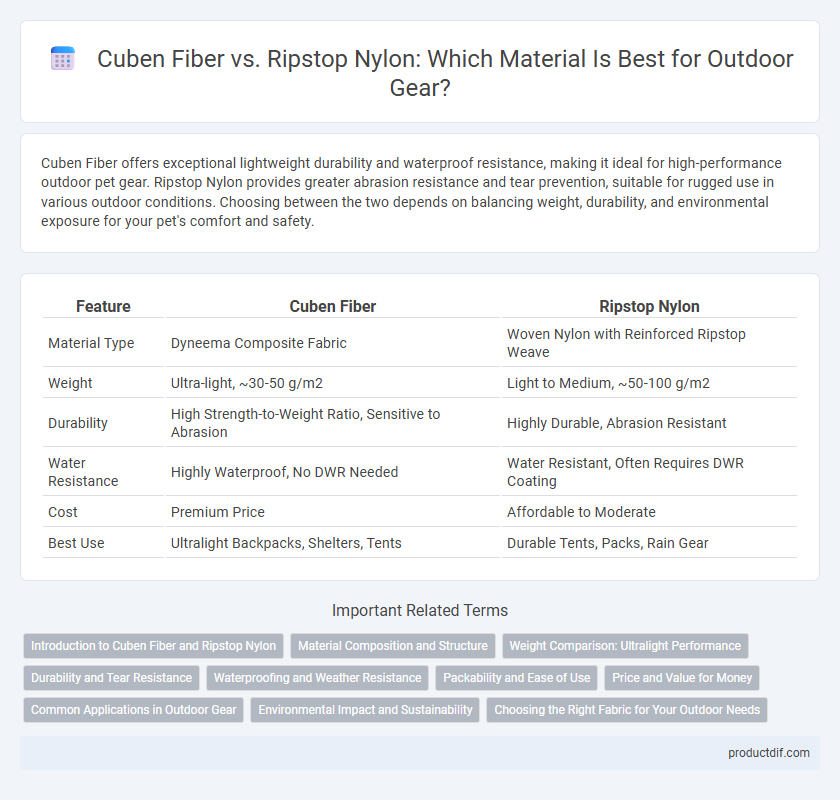Cuben Fiber offers exceptional lightweight durability and waterproof resistance, making it ideal for high-performance outdoor pet gear. Ripstop Nylon provides greater abrasion resistance and tear prevention, suitable for rugged use in various outdoor conditions. Choosing between the two depends on balancing weight, durability, and environmental exposure for your pet's comfort and safety.
Table of Comparison
| Feature | Cuben Fiber | Ripstop Nylon |
|---|---|---|
| Material Type | Dyneema Composite Fabric | Woven Nylon with Reinforced Ripstop Weave |
| Weight | Ultra-light, ~30-50 g/m2 | Light to Medium, ~50-100 g/m2 |
| Durability | High Strength-to-Weight Ratio, Sensitive to Abrasion | Highly Durable, Abrasion Resistant |
| Water Resistance | Highly Waterproof, No DWR Needed | Water Resistant, Often Requires DWR Coating |
| Cost | Premium Price | Affordable to Moderate |
| Best Use | Ultralight Backpacks, Shelters, Tents | Durable Tents, Packs, Rain Gear |
Introduction to Cuben Fiber and Ripstop Nylon
Cuben Fiber, also known as Dyneema Composite Fabric, offers exceptional strength-to-weight ratio and waterproof properties, making it ideal for ultralight outdoor gear like tents and backpacks. Ripstop Nylon features a grid pattern that prevents tears from spreading, providing durability and abrasion resistance commonly used in outdoor apparel and equipment. Both materials serve distinct purposes: Cuben Fiber excels in lightweight protection and water resistance, while Ripstop Nylon is favored for toughness and versatility in varied outdoor conditions.
Material Composition and Structure
Cuben Fiber, also known as Dyneema Composite Fabric, is composed of ultra-high-molecular-weight polyethylene fibers laminated between polyester films, giving it exceptional strength-to-weight ratio and waterproof properties. Ripstop Nylon features a woven grid pattern of reinforced threads, providing durability and tear resistance while maintaining breathability. The laminated structure of Cuben Fiber results in a lighter, more water-resistant fabric than the woven, more abrasion-tolerant Ripstop Nylon, making each material suited to different outdoor gear applications.
Weight Comparison: Ultralight Performance
Cuben Fiber, known as Dyneema Composite Fabric, weighs significantly less than traditional Ripstop Nylon, offering ultralight performance ideal for backpackers prioritizing minimal load. Weighing approximately 0.5 to 1 ounce per square yard, Cuben Fiber outperforms Ripstop Nylon, which typically ranges from 1.1 to 3 ounces per square yard depending on denier and weave. This weight advantage makes Cuben Fiber the preferred choice for ultralight shelters and gear where saving every gram enhances overall trail efficiency.
Durability and Tear Resistance
Cuben Fiber offers exceptional durability and tear resistance due to its ultra-high-molecular-weight polyethylene fibers, making it highly resistant to punctures and abrasions in demanding outdoor conditions. Ripstop Nylon, reinforced with a grid pattern of heavier threads, provides strong tear resistance and durability but is generally heavier and less waterproof compared to Cuben Fiber. While Cuben Fiber excels in lightweight strength and tear resistance for ultralight backpacking, Ripstop Nylon remains a reliable choice for rugged use with better flexibility and cost efficiency.
Waterproofing and Weather Resistance
Cuben Fiber offers superior waterproofing and weather resistance due to its non-porous, laminated construction, making it highly effective against heavy rain and wind. Ripstop Nylon provides good durability and moderate water resistance with a DWR (durable water repellent) coating but may require reapplication to maintain waterproof performance over time. Cuben Fiber's lightweight, high-strength fabric excels in harsh weather conditions, while Ripstop Nylon balances ruggedness with breathability for versatile outdoor use.
Packability and Ease of Use
Cuben Fiber offers exceptional packability due to its ultra-lightweight and minimal stretch properties, making backpacks and tents compact and easy to stow. Ripstop Nylon provides greater durability and flexibility, enhancing ease of use through increased abrasion resistance and better handling in varied weather conditions. Choosing Cuben Fiber is ideal for ultralight enthusiasts prioritizing minimal bulk, while Ripstop Nylon suits those requiring robust gear that balances packability with toughness.
Price and Value for Money
Cuben Fiber, known for its exceptional lightweight durability and waterproof properties, commands a higher price point compared to Ripstop Nylon, making it a premium option for serious outdoor enthusiasts. Ripstop Nylon offers a more affordable alternative with decent durability and water resistance, providing excellent value for casual hikers and budget-conscious adventurers. Evaluating usage frequency and performance needs helps determine whether Cuben Fiber's investment justifies its cost over the cost-effective Ripstop Nylon.
Common Applications in Outdoor Gear
Cuben Fiber is favored in ultralight backpacking and high-performance shelters due to its exceptional strength-to-weight ratio and waterproof properties. Ripstop Nylon is commonly used in tents, backpacks, and rainwear for its durability, abrasion resistance, and affordability. Both materials serve essential roles in outdoor gear, with Cuben Fiber preferred for weight-sensitive applications and Ripstop Nylon valued for rugged, cost-effective gear.
Environmental Impact and Sustainability
Cuben Fiber, also known as Dyneema Composite Fabric, is lightweight and highly durable but less eco-friendly due to its petroleum-based production and limited recyclability. Ripstop Nylon, while heavier and less durable, is often made from recycled materials and is more readily recyclable, offering a lower environmental footprint. Choosing ripstop nylon supports sustainability through better biodegradability and more widespread use of recycled fibers in outdoor gear manufacturing.
Choosing the Right Fabric for Your Outdoor Needs
Cuben Fiber offers exceptional strength-to-weight ratio and waterproof capabilities, making it ideal for ultralight backpacking and high-performance outdoor gear where every ounce counts. Ripstop Nylon excels in durability and abrasion resistance, providing reliable protection against tears and punctures for rugged activities and prolonged use. Selecting between Cuben Fiber and Ripstop Nylon depends on balancing weight considerations with the need for toughness and longevity in your specific outdoor environment.
Cuben Fiber vs Ripstop Nylon Infographic

 productdif.com
productdif.com